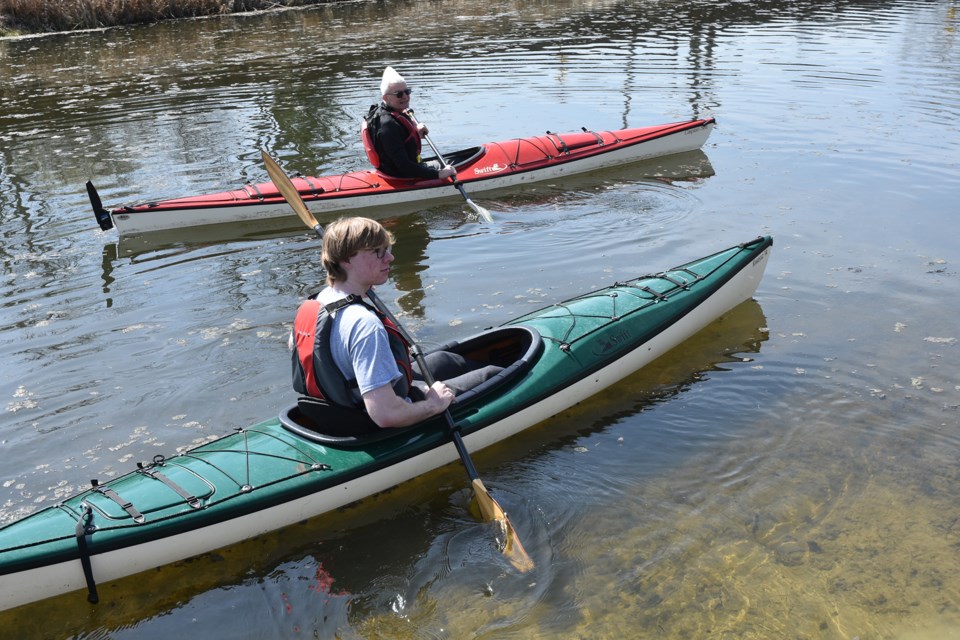For the first time in decades, the annual Marsh Mash marathon canoe and kayak races will make a full circuit of the canals that ring the Holland Marsh polder – a distance of approximately 28 km.
That was the route of the very first race, organized in July of 1979 by paddlers Janice Matichuck and Peter Puddicombe.
Iain Craig was one of the paddlers who competed in that inaugural year, in a canoe.
“Back at that time, we had MC1, MC2 and MC3. MC1 was what we now call a ‘pro’ boat,” or racing canoe, Craig says.
He was in a recreational canoe. “It took us four hours and three minutes, the weeds were so bad at Highway 9,” he remembers. The south canal had silted in, in places, requiring paddlers to get out and drag their canoes, mashing down the bullrushes and water weeds.
“That’s where Peter and Janice got the name, the Marsh Mash – and it stuck!”
In year two, the Lake Simcoe Region Conservation Authority took over operation of the race, which not only offered a great marathon paddling experience on a safe course – no rapids, no rocks, no strong currents – but a chance to view the wildlife and ecology of the marsh.
When the LSRCA was hit by budget cuts, under the austerity Harris provincial government, it stepped away from running the races – and Craig stepped in. He and his family, friends, volunteers, and now the Town of Bradford West Gwillimbury, have continued to host the Marsh Mash, year after year.
It is now the fourth oldest marathon canoe race in Ontario.
Sanctioned by the Ontario Marathon Canoe Kayak Racing Association (OMCKRA), the races offer canoeists, kayakers, stand-up paddleboarders and outrigger paddlers, ranging from competitive to recreational, an opportunity to compete.
The Mash is also a World Team qualifier for ICF Junior Kayakers seeking a berth on the Canadian team at the World Marathon Canoe and Kayak Championships.
For years, however, the longest distance offered was 24 km: siltation in the south canal made it too difficult to run a full circuit. Until this year.
The relocation and reconstruction of the canals, and completion of construction at Highway 9, have made it possible to offer a 28 km marathon race “for the first time in 38 years.”
Craig had hoped to offer the full route earlier, but COVID-19 forced the cancellation of racing in 2020 and 2021. Now that the Marsh Mash is back, the 28 km circuit will be available for Senior ICF Kayaker (Men and Women), Senior ICF C1 and C2 paddlers, and stand-up paddleboarders.
Initially, Junior ICF Kayakers were also going to paddle the full route, but the decision was made to stick to an 18 km course, along with Open Kayak and Marathon Canoe classes.
For those who want a less strenuous challenge, the Mash offers 9K races for recreational Canoe (Open), Recreational Kayak (Men/Women), recreational stand-up paddleboarders and outrigger canoes.
There is also a 6K race, for young kayakers (U13) and C2 Adult/Child canoe teams.
“We’ve got classes for people who are very competitive. We’ve got classes for people who just want to do it,” Craig says. “The new canal is just ideal for paddlers. There are no rocks. There are no water conditions that are difficult. It’s deep, so you’re not hitting the bottom. And the wildlife - the birds, muskrats - is amazing.”
Since 2001, the races have started and finished at what used to be Springdale Christian Reformed Church, on the 5th Sideroad of Bradford West Gwillimbury at Canal Road. Now Sovereign Grace Church, the facility continues to welcome Marsh Mashers, making parking lot, washrooms and meeting rooms available for the race.
There will be t-shirts for the participants, and perhaps commemorative mugs, provided by the town, but Craig notes, “We haven’t gone overly big on prizes. People come to race.”
Only a handful of paddlers who took part in the first Marsh Mash 42 years ago are still paddling competitively, he says. Among them is Jim Preece, who came out on the weekend with son Tyler, to try the waters of the reconstructed canal in his cedar strip 1930s Peterborough sailing canoe.
He was joined by Steve Quattrin, another long-time recreational kayaker, and Craig’s grandson, Evan Welburn.
Things have changed from the early days of the Mash, Craig says. The boats are much lighter, made of carbon – “Back in the ‘80s, we raced home-made cedar strip boats,” he says. “Paddles are carbon – lighter – and the technique has improved. And I think paddlers train more.”
He expects the strongest competitors to be able to finish the 28K circuit in under two and a half hours.
“We’ve had some very topnotch Canadian paddlers here,” Craig notes– including Canadian Sprint Canoe gold medallist Larry Cain in 1988, and 2012 Olympic medallists Mark Oldershaw and Adam van Koeverden, who attended the 2013 Marsh Mash.
And there is always the chance that future Olympic medallists will gain experience and a place on the Canadian team, starting with their performance at the Mash.
The past several years have been a challenge for Craig, who is also a competitive Dragon Boat racer, and outrigger canoe paddler.
He lost his son and paddling partner Scott in 2016, and his beloved wife and partner Peggy in 2019, but has continued to organize the Marsh Mash, with help from daughter Andrea Welburn, his grandchildren, and the paddling community.
And Craig is already looking ahead, planning which of the notable paddlers he will invite to return – for the 50th annual Marsh Mash. That may be eight years in the future, but like any marathon canoeist, Craig plans to just “keep going!”
For more information or to register for this year’s Marsh Mash, which takes place on Saturday, May 14, visit the Marsh Mash website.



